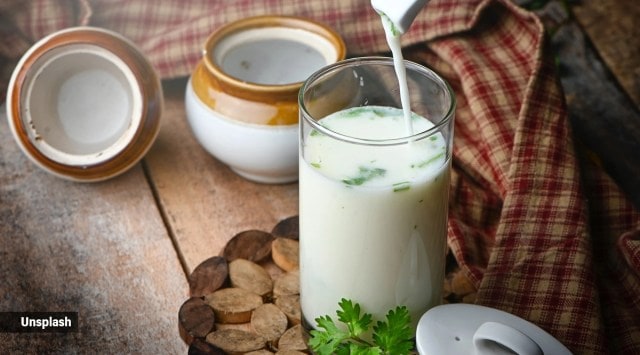📣 For more lifestyle news, click here to join our WhatsApp Channel and also follow us on Instagram
Buttermilk or curd, yoghurt: What you should have (and avoid)
"It is best to stick with sweet buttermilk if someone has digestive issues like constipation, gastric or acid reflux, etc," said Dr Yogini Patil, BAMS and nutritionist
 Buttermilk has a host of health benefits. (Source: Unsplash)
Buttermilk has a host of health benefits. (Source: Unsplash)Despite coming from the same source — milk — many a time, experts suggest consuming buttermilk instead of curd or yoghurt. But, why is it so, and what is the difference (or similarity) between the three? According to Dr Dimple Jangda, an Ayurveda and gut health coach, there is not only a difference between buttermilk, curd and yoghurt, but also in the way they react inside the body.
Curd and yoghurt have an active bacterial strain that ferments on coming into contact with heat. “So, when it comes into contact with your stomach heat, they start fermenting aggressively and instead of having a cooling effect, they actually warm up or heat up your body and intestines,” Dr Dimple said in an Instagram video. However, the minute you add water to curd or yoghurt — to make buttermilk — the fermentation process stops, making it “cooling in nature” as compared to curd which takes longer to digest.
Additionally, according to Dr Dimple, buttermilk is suitable for all three body types and all seasons, and it is also shadarasa or has all six tastes incorporated in it when topped with condiments. “It is far healthier than curd,” she stressed. Further, while curd and yoghurt increase fat, strength, and help reduce vata imbalances, they should be avoided if you have certain health conditions.
View this post on Instagram
Who should avoid curd or yoghurt?
*People with obesity, kapha disorders, bleeding disorders, inflammatory disorders, increased stiffness, and rheumatoid arthritis should avoid curd and yoghurt.
*Curd consumption at night is not recommended as it can trigger cold, cough, sinus (But if you are habituated to consuming curd at night, ensure to add a pinch of pepper or fenugreek.)
*Avoid heating curd as it destroys all useful bacteria. (But in some regions, curries are made by heating yoghurt or curd. People are habituated for a very long period of time, such that their bodies can tolerate it well.)
*Curd is not advisable for those with skin disorders, pitta imbalances, headaches, disturbed sleep, and digestive disorders.
“Buttermilk is considered the best substitute for curd. For human beings, it is considered an equivalent of nectar,” Dr Dimple mentioned in her post, as she further shared a recipe to prepare buttermilk: Whip 2 teaspoons of curd or yoghurt and add 1 glass of water to it. Add some cumin powder, pink salt, and garnish with cilantro.
Some benefits of buttermilk are:
*Maintains health and treat diseases.
*It is easy to digest as it improves digestion and is suitable for all three body types.
*It is useful in the treatment of inflammation, digestive disorders, gastrointestinal disorders, lack of appetite, spleen disorders, and anaemia.
*It is beneficial even during winters for treating indigestion
Additionally, Dr Yogini Patil, BAMS and nutritionist, LivLong, suggested reasons to opt for buttermilk over curd.
*For digestion: Buttermilk is light in nature, making it very easy to digest; it also helps to stimulate appetite. Curd is heavy to digest, and hence should be avoided for dinner. Also, it is best to stick with sweet buttermilk if someone has digestive issues like constipation, gastric or acid reflux, etc.
*For weight loss: If you have excellent digestion and regular movements, curd can be consumed to help you gain weight. If you are looking to lose weight, stick to buttermilk and steer clear of curd.
*It keeps you light: Curd has a hot potency, whereas buttermilk is just made of curd, but the production and formulation of buttermilk give it a cool potency. Therefore, in summer and in hot environments, avoid curd and consume buttermilk instead.
📣 For more lifestyle news, follow us on Instagram | Twitter | Facebook and don’t miss out on the latest updates!
📣 For more lifestyle news, click here to join our WhatsApp Channel and also follow us on Instagram




- 01
- 02
- 03
- 04
- 05























